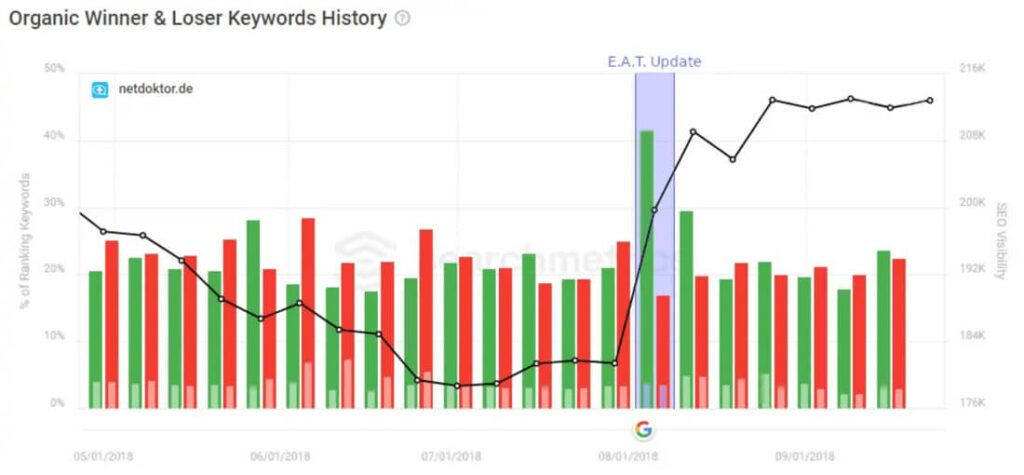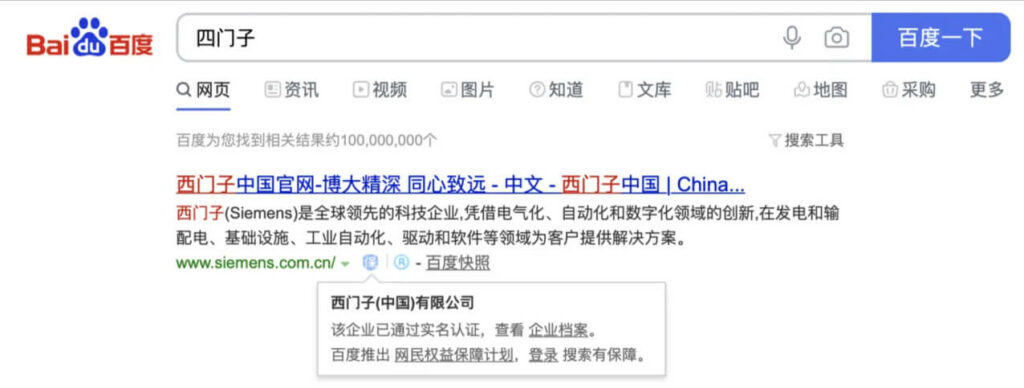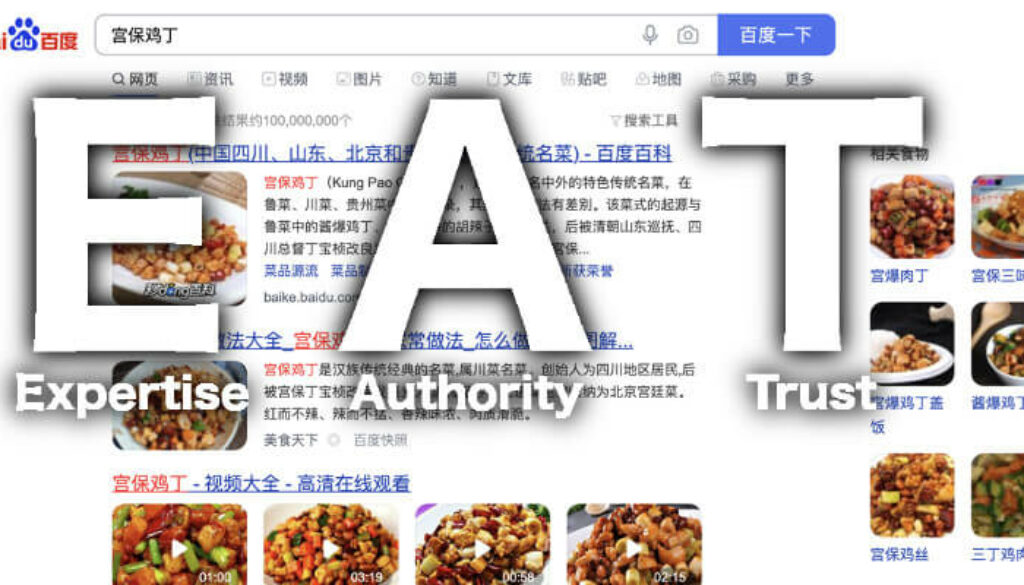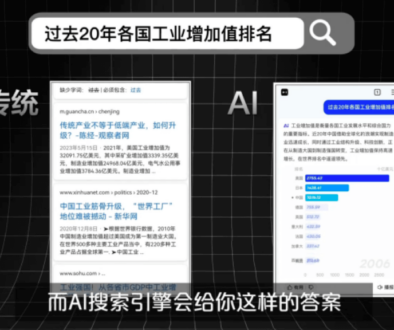Chinese Search Food – What does E.A.T. mean to Baidu?
This article tries to deduce that expertise, authority and trust (E.A.T.) are not really new aspects and come into play not only with Google but also with the Chinese search engine Baidu. Concrete indications are worked out, such as E.A.T. can be optimized in terms of Baidu.
Table of Contents
YMYL – EAT – and how do we know these abbreviations
In the summer of 2018, Google revised its Quality Rater Guidelines and paid more attention to the area YMYL (Your Money or Your Life) and, in this context, the explanation of “E.A.T.” (Expertise Authority and Trust). The SEO community around the world was aware of it when, shortly afterwards, a major core algorithm update was carried out by Google, the effects of which can often be explained by precisely these aspects. In particular, websites from the areas of “Your Life” (websites with editorial medical content) but also “Your Money” (online shops, finance) were hit either positively or negatively.

But the idea of “expertise”, “authority” and “trust” is not really new. All search engines have their relevance criteria, which deal more or less with these three core areas and answer this question anew for each individual search query and for each search intent, which form of expertise, which form of authority and how much of it, as well as how much trust it is required in order to be able to answer the respective search query satisfactorily for the search engine user.
E-A-T in the Zhongguo
In China, Baidu is the largest classic web search engine with a market share of 80% – comparable to Google in the rest of the world.
Baidu is the starting point for numerous excursions into the online world. Knowledge research is carried out (Informational Search Queries), official websites of exciting brands are searched for (Navigational Search Queries) and websites are found where you can book services or buy products (Transactional Search Queries).
In China, buying online is different
Even if the Internet in China, especially in the transactional area, is not quite as online shop-driven as in Europe or the USA, but often takes place on platforms such as Taobao or JD (comparable to Amazon Marketplace in Germany), it still remains important, also as Western brand that wants to do business in China to operate an official website where customers can quench their thirst for knowledge about the brand, the company’s mission and of course the products.
One should be aware that the Chinese customer also prefers branded products to the many cheap copies available on every corner. The “Made in Germany” brand is a quality criterion. Even if many western companies have production in China and sell officially in China as well as in Germany, customers who have the opportunity prefer to use the product reimported from Germany, as one suspects better processing and strict quality control.
This is not a call to import goods produced in China to Germany in order to then send them back to China and make them available to an audience of millions there. This is only a testimony to the quality standards that the Chinese end consumer has towards products from Europe and the USA.
For some time now, this quality requirement has also been carried over to the Internet and web search.
In May 2016, Baidu was overtaken by this quality standard and held responsible by the Chinese government: clinics had placed ads in Baidu for surgical methods that in some cases led to the death of patients. Instead of just holding the clinics accountable, Baidu was accused of providing them with a stage.

Baidu had to take the consequences and has immediately paused the entire Baidu ads program. From now on, no company was able to place paid ads in the Baidu search. Baidu must have made billions in losses at the time. This financial dry spell lasted until July 2017 – i.e. more than 12 months, in which Baidu presumably worked intensively on the revision of the ads already stored in the system and forcibly paused, as well as on guidelines for automatic comparison mechanisms and other methodologies in order to improve the quality of ads in the future secure and block health-critical issues directly.
We can see from this example that the topics “Expertise” and “Trust” must also be important for Baidu, while in the past, “Authority” were the main aspects that Baidu trusted more superficially.
Reason enough to take a look at how Baidu can deal with the evaluation of expertise, authority and trust, or how we as search engine optimizers can pay more attention to being able to demonstrate our expertise, trust and perhaps a little authority to Baidu.
The following discussions are not ranking factors publicly communicated by Baidu, but are derived from observations of Baidu search results.
What is Expertise?
Expertise demonstrated on a website is understood to mean that the author is so familiar with the subject matter presented and that he can assess the user’s intention so well that he provides the visitor with exactly the content that he expects.
This means that the author uses exactly the terminology that is appropriate to the topic and that an attentive reader with a little background knowledge would expect.
Tables, lists and pictures are used if this is appropriate for the topic and the expectations of the visitor.
The search engine works out the certainty about the necessary vocabulary and depth by observing how relevant documents for a search phrase or topic perform in the user behavior in the search results. Documents that have better user signals must have something that the other documents do not have or have too much. The search engine recognizes the similarities of well-performing content on a topic and the differences to the less well-performing content.
The Baidu SERPs for the individual search terms change much more intensely every day than one is used to from Google.


How can SEOs know whether a content demonstrates sufficient depth to proof expertise?
The SEO / editor can now make use of the preparatory work done by the search engine. The composition of the Baidu Top 10 to Top 20 rankings are (at this point in time) the most thematically relevant documents for a search query.
It is therefore necessary to have a native speaker determine which terms are used in these documents. What level of detail do the individual articles experience? Which content formats are used and what are the individual content formats used for?
For example, it is not enough to recognize that a table is used in 5 out of 10 relevant documents. It is also necessary to recognize what kind of information is presented in the table.
This is not about copying information. The information communicated in the table on your website can deviate (and should also do so if it is not generally recognized values, such as the information from how many degrees and at what height above sea level water freezes). Rather, it is about meeting user expectations as to which type of information should be presented in which content form. Baidu has already analyzed this (by testing which URLs are best received by the searchers).
Especially with evergreen content, i.e. with all pages that you intend to achieve good rankings over the years – these do not have to be editorial / informative pages, but can also be, for example, product category pages – it applies regularly to test whether the content can still keep up with the expertise offered on competitor websites. Whether the content corresponds to what the user expects.
What is Authority?
Website authority is an old concept based on Google’s first PageRank patents. The guys from Mountain View were among the first to calculate a kind of authority – the PageRank – based on how often a website was referenced and how “strong” those referring pages were (ie how often they were referenced) . Since then, all the major search engines such as Microsoft, Yahoo, Yandex, Bing and also Baidu have developed their own concepts, but these basically go back to this idea: if a website is often linked – and especially by “strong” websites, it must have a certain reputation / Have authority.
Of course, it is far too short-sighted and usually belongs in the SEO moth box to only look at numbers like “number of links” or “number of linked domains”. However, there is often a lack of sophisticated PageRank-imitating concepts that also cover topics (travel, automotive, food, …), niches (camping vs. hotels vs. holiday apartments, club vacations vs. city tours vs. individual trips, …) and user intent (informational vs. Transactional vs. Navigational), which would be available to SEOs outside of the AI laboratories of the search engine giants. So unfortunately we SEOs don’t have much choice but to look at such KPIs.
Accordingly, I selected 45 domains from the top 100,000 domains in the Baidu SERPs according to Searchmetrics SEO-Visibility, randomly from “top” to “bottom” from the list and subjected them to a KPI-based analysis.

Although searchmetrics’ own backlink crawler has made a quantum leap forward in recent years, a backlink KPI based on data from just one source can never be as good as the KPIs of an aggregator like LinkResearchTools. So, in addition to our own Searchmetrics Page Strength (SPS), I also included the LinkResearchTools Power * Trust and the number of linked domains, which were aggregated by the LinkResearchTools from more than 20 backlink sources, in the comparison.

Explanation of the KPIs:
SEO Visibility (for China) is a KPI calculated by Searchmetrics in which, based on a fixed representative keyword set for China, the top 50 rankings per keyword are collected, analyzed and based on the ranking position, the expected CTR (also influenced by ads and SERP Features) and the search volume for each domain an aggregated integer value is calculated that can demonstrate the visibility of a domain in the organic Baidu search results compared to competitors. The higher the value, the more visible the domain is.
Domain Popularity is synonymous with the number of domains whose websites link to URLs of a target domain. The more referring domains (domain pop), the more likely the linked domain is an authority.
Searchmetrics Page Strength (SPS) is the attempt to express the strength of a link profile of a domain using a KPI with a value between 0 (weak) and 10 (strong). This is done based on the backlink profile of a domain collected by the Searchmetrics link crawler.
LRT Power * Trust is a long-established, two-dimensional (strength and trust) replacing Google PageRank strength and trust rank KPI from the link research tools since 2012. The minimum value is 0 while 100 corresponds to the maximum achievable value.
Not surprisingly for many SEOs, we find a clear correlation between all these authority metrics on the visibility of the domains in the Baidu SERPs:

While we can only see a relatively weak positive correlation between the number of linked domains (domain pop) and the SEO visibility, the correlation increases when looking at LRT Power * Trust and SPS.
We can therefore assume without further ado that Baidu also takes the authority of a website into account when evaluating domains and making the decision based on them for which content gets which rankings in the search results.
What is trust?
“Trust” translates into “to trust someone”, “to believe what they say”, “to trust that they do not betray you” and is certainly the most difficult aspect of an E.A.T. concept to assess. I think we as humans can agree that, depending on the situation in which you are currently, you base a different level of trust in your counterpart in order to follow the statement of the other and to align the next steps accordingly.
Example: When it comes to deciding whether you want to have your gallbladder removed, you will not trust the statement of the grandmother of the construction worker, who is currently pulling up the neighbour’s wall and who you complain about your pain in passing, and therefore not directly Make an appointment for an operation, but get the opinion of a specialist doctor.
Example 2: Nor will you ask the surgeon to name the ratio of cement to sand to water that you need to cement the curbs of the path, but rather put your trust in the neighbour’s construction worker at this point.
As people, we make the difference when we trust whom we turn to, depending on the expertise (see above) we need.
Even if we can perhaps deduce from this that trust results from the combination of expertise and authority, we still know very specific trust signals for SEO in China. Some of these are theoretical and cannot be clearly proven. Others are no less theoretical – but at least under Baidu’s direct control.
ICP License
In order to be able to apply for an ICP (Internet Content Provider) license in China, the Chinese government usually requires a subsidiary in China. Above all, this serves the possibility of holding those responsible for content accountable for e.g. (in China) illegal content.
Therefore, the existence of an ICP license, which is usually communicated publicly in the footer of a website, is a promise by the content publisher (= website operator) to adhere to the laws applicable in China. Therefore, the existence of an ICP license in this regard is definitely a trust signal that (presumably) no illegal content will be published.

Authenticity certification
To protect the rights and interests of Internet users, Baidu has a program for verifying the authenticity of Internet pages. This serves to protect the internet user from fake brand websites, for example.
This is shown in the search results:

A click within the tooltip leads to a detailed company entry at Baidu:

In addition to these very obvious trust factors, user signals (click-through rate, time-on-site, low bounce rates, …) but also, for example, backlinks from trustworthy sites can certainly lead.
Outside of China, we know Wikipedia here, for example. In China, this position is taken by Baidu’s own wiki page: Baidu Baike (https://baike.baidu.com/). This wiki is also maintained and filled by users, and this wiki is also subjected to similar, if not stricter controls than Wikipedia. Placing a real backlink in Baidu Baike is almost impossible today. But it is at least possible to give an official fire on Baidu Baike even more content. In combination with an ICP license, Baidu Registered Business, website authenticity certificate and a valid SSL certificate, the technically possible aspects of “trust” would certainly have been covered well.
Chinese Social Medias
What many western companies often forget when setting up their websites for China is the exchange of links to their social media channels with the social media channels commonly used in China.
Facebook, Twitter and Pinterest, as well as many other western social networks, can only be used in China with the use of a VPN. However, normal Internet users in China do not use this. Clicking on a Facebook symbol will inevitably lead to frustration – if the visitor is not already irritated by not seeing the social networks he is familiar with.
In the Baidu Ranking Factor Study, which will soon be published on Searchmetrics, we found at least one reference to one of the many Chinese social networks on 99.9% of all pages ranking in the Baidu Top10. Above all WeChat and QQ. This is not always a link. WeChat is often only made available with a QR code that can be scanned with a smartphone, and QQ by naming the company’s own QQ ID.
Conclusion:
Even if we E.A.T. especially in connection with the Google Quality Rater Guidelines and hear again and again in connection with new Google updates, the concept of expertise, authority and trust is nothing new and has always been used in one form or another by search engines to Being able to evaluate documents on the Internet and qualifying them for the search results – or not.
This is no different in China. Only the details that you can pay attention to in order to have a positive influence on expertise or authority or trust are sometimes different in China than in Germany or the USA, for example.
If you want to learn more about SEO for Baidu, I would like to encourage you to check out the Searchmetrics blog more often in the near future, as we will be publishing the first Baidu ranking factor correlation study in the coming weeks. Also, my book on SEO for China will be out soon. If you would like to be informed when it appears, please subscribe to the mailing list at seoforchina.com. Thanks very much!



